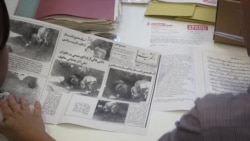Iran is guilty of crimes against humanity for covering up the mass executions of at least 5,000 political prisoners 30 years ago, according to a new report from Amnesty International.
The human rights group wants the United Nations to open an inquiry into the killings and disappearances in 1988 which targeted supporters of Iranian opposition groups. Many families still do not know what happened to their loved ones since the disappearances.
Tehran has never admitted to the killings, revealed the whereabouts of the bodies or the fate of those who disappeared.
“That crime is still alive and active until the state in question, Iran, accounts for what happened to those people,” Kumi Naidoo, secretary-general of Amnesty International, told VOA.
Through hundreds of interviews and documents, Amnesty details how thousands of jailed political activists were executed or disappeared following a "fatwa" or religious order given by then-Supreme Leader Rouhollah Khomeini.
Many were supporters of the People’s Mojahedin Organization of Iran (PMOI), an outlawed opposition group based in Iraq, which in 1988 staged an armed incursion in Iran. In the following weeks, between late July and early September, Amnesty said the regime tried to wipe out the opposition through mass executions.
Groups of prisoners were rounded up, blindfolded and brought before committees involving judicial, prosecution, intelligence and prison officials. Amnesty said the proceedings were summary and arbitrary in the extreme, and the victims only discovered they were to be executed minutes before they were lined up before a firing squad or nooses were put around their necks.
Many of the officials accused of taking part in these committees currently hold powerful positions in the state.
“Certain government officials who enthusiastically were engaged in forced disappearances and executions, today still hold positions of power, not just in the government, but importantly also in the judiciary that can block progress to get justice on an issue like this,” said Naidoo.
Two years ago, an audio recording was leaked purportedly revealing senior Iranian officials discussing the details of the mass executions. Following the leak, Tehran called the perpetrators ‘heroes’ who were defending the nation from invasion.
Amnesty accuses the government of continuing a policy of cover-up and misinformation, destroying mass graves and refusing to reveal the whereabouts of those killed or missing.
“The lack of condemnation from the U.N. Commission of Human Rights at the time, and the failure of the U.N. General Assembly to refer the situation to the Security Council, emboldened Iran’s authorities to continue to deny the truth and inflict torture and other ill-treatment on the families,” according to Amnesty’s report.
The human rights group has urged Iran and the United Nations to open an investigation to finally deliver justice and closure.





